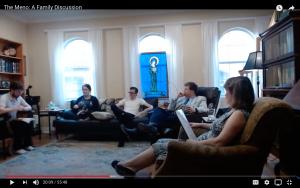“There is no such thing as a bad question.”

This is wrong, sort of.
There are bad questions, though there are very few bad sincere questions. Imagine a “question” that is just a set up for a lecture or a social media shaming. This is the insincere question and it is worse than asking no questions at all.
An insincere question is a bad question, because such a question kills any genuine conversation. The insincerity is a virus that sickens the conversation and eventually kills the community needed to learn. I have seen this happen. . . God help me I have done this myself. When I face a problem like this, I turn to wiser people, in this case Plato.
Plato gives an example of a bad question in his dialogue Meno. Since the entire educational method he advocates begins with questions, the fact that the dialogue begins with a question is very important.
MENO: I wonder whether you can tell me, Socrates, whether excellence is teachable or, if not teachable, at least a product of habituation. Or perhaps it isn’t the kind of thing one can practice or learn, but is a natural human endowment. If not, how do people become good?*
This seems like a very good question. Is virtue something that can be taught? Our entire School and College hopes that we can teach, encourage, help souls achieve virtue. That is our bias, but a commitment to the dialectic, the endless pursuit of the Logos of God, means we have to consider that we are wrong. Plato challenges the idea that virtue can be taught and we are left unsure at the end of the dialogue or at least we are left unsure if we follow the arguments. Meno is not interested in following arguments. He likes giving grandiloquent speeches that increase his social prestige. He thinks he knows the answer so he is not really asking, but setting up his powerful speech. In the end, this sort of man will kill Socrates, because he loves the truth more than culturally acceptable ideas.
Beware the false or insincere question.
Too often we start a sermon or teaching with a question, but the question is unreal. We do not wish to hear alternative points of view. Instead, we “know” and so we pause to let the audience (God help us!) give their views and then we blast them with our truth. This is false education, not a genuine education, because the answers are immune to any genuine question. Error needs this defense, truth is too confident to stoop to such a tactic.
Of course, another false move is the slick rhetorician who apes the spirit of our age while playing off his or her knowledge of culturally unpopular ideas. He has “outgrown” (often scandalously) the “old” ideas and now is merely “posing questions.” This sophist, often famous for being the decadent child of some genuine Christian figure, can parlay his “questions” (which have only one acceptable answer to the sophist and his marks) to a living. You can spot such a person by their obsessive recapitulation of the “I was once one of them” and “now I stand as an honest broker asking my questions.” We all know that there is only one acceptable set of answers.
These are grandiloquent-Judas to the dialectic.
Yet nobody should assume that their own views, politics, or theories make them safe from this vice. Genuine Christianity, orthodox, is often corrupted by those who will not consider their own beliefs. They do not wish to live by faith, but weird certainty. When certainty does not come, they preach louder. They ask questions, but have the answers in mind. Even if the answers are true, the dialectic, the spirit of wisdom, has been betrayed.
These are the religious leaders who find the Judas and give him the silver.
What must we do? We must ask the questions we have. We must be guided by best reason, experience, and revelation. We dare not rely on our personal experience.
“There is, probably, no such thing as a bad sincere question.”
*Waterfield, Robin. Meno and Other Dialogues: Charmides, Laches, Lysis, Meno (Oxford World’s Classics) (p. 99). Oxford University Press. Kindle Edition.












